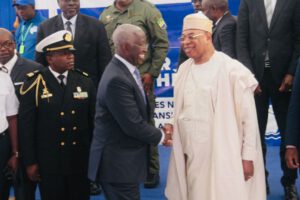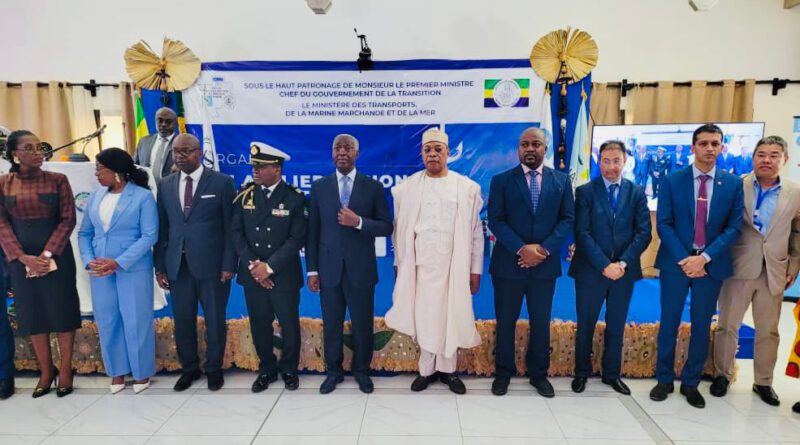Water way Disasters: Nigeria Advocate For Adequate Monitoring Of Ferry Service To Boost Blue Economy Potentials, Safety Of Lives
By Raheem Ibrahim
The Secretary General of the Maritime Organisation of West and Central Africa (MOWCA), Dr. Paul Adalikwu has called for adequate monitoring of ferries operating on sea against overloading and use of unserviceable crafts.
Describing safe inland waterways ferry services as an additional avenue to grow the blue economy potential of countries in Africa, he emphasized that proper monitoring will stop the incessant sea tragedy where innocent people lose their lives.

In his contribution at MOWCA Regional Workshop on Safety of Inland Waterways and Passenger Ferries recently held in Libreville, Republic of Congo, Adalikwu said Africa’s marine endowments are capable of supporting economic development by promoting seamless, safe and convenient transportation along coastal areas on the continent, if properly harnessed.
He however called on African governments to ensure adherence to safety standards in the operation of ferries as a first step measure to prevent deaths caused by accidents.
While identifying unserviceable crafts, overloading, non usage of life jacket, weather conditions and wrecks along navigable channels, called on African governments to invest in training and retraining of crew members, onshore and offshore staff on safety
He opined that the vast wrecks in most waterways causing marine accidents could recycled for economic benefits after removal to ensure conservation of the marine ecosystem
According to him, “It has become imperative for all tiers of government from the federal, state and down to local authorities to pay attention to marine safety as the severally reported cases of deaths were attributable to non adherence to safety measures including traveling at night where there are no lights to illuminate the waterways leaving high chances of fatal collision”.
He identified that marine related accidents and deaths have been recurrent while expressing optimism that safety standard could be attained as obtainable in the aviation sector
The SG said “MOWCA accident statistics have shown a rising trend of reported marine accidents in the waterways and we believe these are preventable when we increase our education, sensitisation, procurement of safety materials and gadgets backed with necessary enforcement
“There are years where zero aviation accident is recorded in most counties in West and Central Africa but we cannot say the same thing about the marine sector, especially with regards to inland waterways
“I hereby call on governments at all levels to pay close attention to safety even on smaller crafts powered by outboard engines. Ferry boat operators should not be allowed to risk their lives and the lives of the passengers they carry
“Our inland waterways are critical for trade, social development and tourism within the various countries in Africa and trans border commercial activities under the African Continental Free Trade Area (AfCFTA) , it should therefore come under state spotlight for security and safety
“The incessant loss of lives and property from ferry accidents in the sub-region and in particular the Esther Miracle ferry accident that occurred in Gabon in on 8th March 2023, and several other cases in other countries have necessitated the need for this workshop. This event was part of the MOWCA-IMO Joint Action Plan (JAP) on cooperation and collaboration between the two maritime organisations” he said.
The workshop held from July 15 to July 18,2024, drew participants from nine countries and had resource persons from the International Maritime Organization (IMO) and the International Maritime Rescue Federation (IMRF).
The workshop was declared open by His Excellency Mr Raymond Ndong Sima, Prime Minister, Head of the Congolese Transition Government.
Other dignitaries in attendance including Navy Captain Loic Moudouma Ndinga, Minister of Transport, Merchant Marine and the Sea, Republic of Gabon; Marco Yamaguchi, Division Manager, Infrastructure & Urban Development, Transport & Logistics Division, African Development Bank (AfDB)
The three (3) day workshop which was moderated by Capt. Sidney Direndi of the Merchant Marine and Chief Agu Chukwuemeka Cajetan, Maritime Consultant and a former Director at the Nigeria Shippers Council (NSC) comprised of topical presentations by the three lead speakers, Dr. Anish Hebbar of the World Maritime University Malmo, Sweden, Capt. Dallas Lareya, IMO Regional Coordinator for West and Central Sub‑Region of Africa and Capt. Mohammed Drissi, Africa Coordinator, International Maritime Rescue Federation (IMRF).
The speakers underscored the critical significance of the workshop’s theme and stressed the collective duty of the maritime community to prioritize the safety of inland waterways and passenger ferries. They emphasized the need for a comprehensive assessment of legislative deficiencies in safety and security, along with proposing solutions to addressing them.
They also shared country experiences and insights on ferry operations in the Central African Republic, Gabon, the Gambia and Nigeria. Other presentations at the workshop included marine insurance and inland waterways, bestb practices for passenger ferry safety, risk management strategies, and the implementation of international maritime safety standards. Overall, the presentations aimed to equip participants with practical knowledge and skills for improving safety on inland waterways and passenger ferries in the sub-region.
The communique issued at the end of the workshop urged MOWCA, World Maritime University and the IMO to consider creating opportunities for capacity training programm be rebated, partially or fully sponsored for stakeholders in the inland waterway sector;
To ensure the enforcement of safety culture by public entities and operators and encourage the use of the model of countries that have successfully secured funding by collaboratively engaging with funding institutions for support in enhancing inland waterways navigation.
Other resolutions were, “To ensure compliance with the maintenance plan of the vessel with respect to the year of built; To encourage member states to adopt code of good practice for ship inspectors and put in place accreditation mechanism for Ship inspectors; To establish a digital system of collecting, managing and reporting the occurrence of incidents;
To develop a contingency plan and operational procedures in the event of a maritime incident;To strengthen the mechanism to monitor navigable waterways and ensure the strictly enforcement of regulation applicable to ships on internal voyages; To raise awareness on the necessity to implement the CEMAC/RDC Regulation on inland waterways navigation; and to adopt the Libreville Action Plan for enhancing operational safety of domestic ferries.
Participating countries were Central Africa Republic, Gabon, The Gambia, Nigeria, Democratic Republic of Congo, The Republic of Congo, Guinea, Sierra Leone and Togo.




